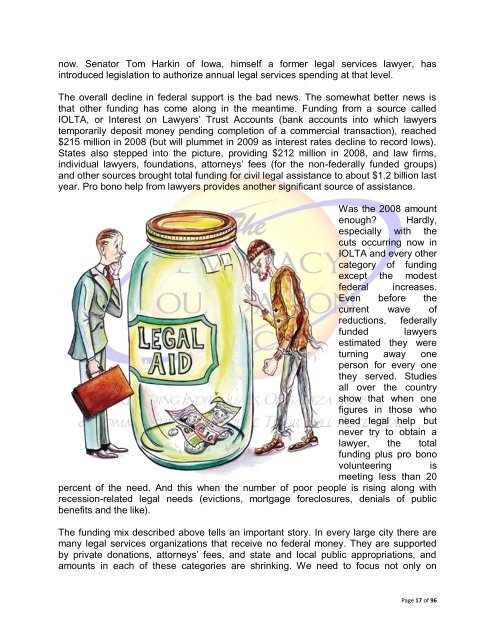Law for The Poor
Law for The Poor
Law for The Poor
Create successful ePaper yourself
Turn your PDF publications into a flip-book with our unique Google optimized e-Paper software.
now. Senator Tom Harkin of Iowa, himself a <strong>for</strong>mer legal services lawyer, has<br />
introduced legislation to authorize annual legal services spending at that level.<br />
<strong>The</strong> overall decline in federal support is the bad news. <strong>The</strong> somewhat better news is<br />
that other funding has come along in the meantime. Funding from a source called<br />
IOLTA, or Interest on <strong>Law</strong>yers’ Trust Accounts (bank accounts into which lawyers<br />
temporarily deposit money pending completion of a commercial transaction), reached<br />
$215 million in 2008 (but will plummet in 2009 as interest rates decline to record lows).<br />
States also stepped into the picture, providing $212 million in 2008, and law firms,<br />
individual lawyers, foundations, attorneys’ fees (<strong>for</strong> the non-federally funded groups)<br />
and other sources brought total funding <strong>for</strong> civil legal assistance to about $1.2 billion last<br />
year. Pro bono help from lawyers provides another significant source of assistance.<br />
Was the 2008 amount<br />
enough? Hardly,<br />
especially with the<br />
cuts occurring now in<br />
IOLTA and every other<br />
category of funding<br />
except the modest<br />
federal increases.<br />
Even be<strong>for</strong>e the<br />
current wave of<br />
reductions, federally<br />
funded lawyers<br />
estimated they were<br />
turning away one<br />
person <strong>for</strong> every one<br />
they served. Studies<br />
all over the country<br />
show that when one<br />
figures in those who<br />
need legal help but<br />
never try to obtain a<br />
lawyer, the total<br />
funding plus pro bono<br />
volunteering is<br />
meeting less than 20<br />
percent of the need. And this when the number of poor people is rising along with<br />
recession-related legal needs (evictions, mortgage <strong>for</strong>eclosures, denials of public<br />
benefits and the like).<br />
<strong>The</strong> funding mix described above tells an important story. In every large city there are<br />
many legal services organizations that receive no federal money. <strong>The</strong>y are supported<br />
by private donations, attorneys’ fees, and state and local public appropriations, and<br />
amounts in each of these categories are shrinking. We need to focus not only on<br />
Page 17 of 96

















